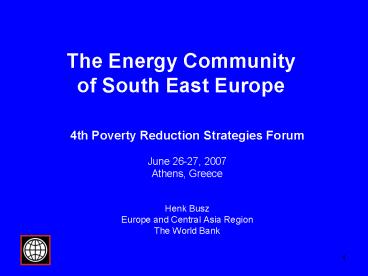The Energy Community of South East Europe - PowerPoint PPT Presentation
1 / 15
Title:
The Energy Community of South East Europe
Description:
Least cost regional approach would save 3.0 billion in investment and ... initial demand from combined cycle gas turbine (CCGT) power stations would be ... – PowerPoint PPT presentation
Number of Views:16
Avg rating:3.0/5.0
Title: The Energy Community of South East Europe
1
The Energy Community of South East Europe
- 4th Poverty Reduction Strategies Forum
- June 26-27, 2007
- Athens, Greece
- Henk Busz
- Europe and Central Asia Region
- The World Bank
2
Why the Energy Community?
- Connect or reconnect to EU and its networks
- Replace aging power generation facilities
- Least cost regional approach would save 3.0
billion in investment and operating costs (fuel)
through 2020 - Enhance security of supply
- Increased interconnection and trade
- Diversify the fuel mix based on least cost
options - Diversify supply routes and sources of gas
- Competition and customer choice (efficiency,
prices) - Important pre-accession mechanism
- de facto condition of EU membership
- integrate over time with EU energy market
3
Regional Energy Markets in Europe an interim
phase (?)
4
EC Treaty signed Oct.28, 2005
Regional Members
EU Member States
Observers
Germany
Ukraine
Austria
Moldova
Hungary
Slovenia
Romania
Croatia
Italy
Serbia Montenegro
Bosnia Herzegovina
Bulgaria
Kosovo
FYROM
Albania
Turkey
Greece
5
Current Parties/Participants/Observers(source
EC Secretariat)
6
Parties/Participants/Observers (cont.)
- Contracting Parties
- Albania, Bosnia and Herzegovina, Croatia, the
former Yugoslav Republic of Macedonia,
Montenegro, Serbia and UNMIK - Participants
- Austria, Bulgaria, the Czech Republic, Cyprus,
Germany, Greece, Hungary, Italy, the Netherlands
(applied for status, to be confirmed at MC),
Romania, Slovakia, Slovenia, UK - Observers
- Moldova, Norway (applied for the status of
Participant), Turkey, Ukraine, and Georgia
(applied for status, to be confirmed at MC)
7
European Energy Agenda
Security of Energy Supply
Competition Customer Choice
Interconnection, creating European grid,
regulation ensuring open access by suppliers to
transmission, enforcing customer choice of
supplier
Diversification of routes and
suppliers, integrated and well-coordinated
networks, gas storage, energy efficiency,
renewable energy
Environment
Energy efficiency, increased use of natural gas,
emission standards, CO2 emission trading and
sequestration, renewables, nuclear energy (?)
8
Energy Challenge in SEE
- Electric Power System of about 80,000 MW needs
significant investment and upgrade - Turkey 35,000 MW and growing, rapid demand
growth projected, shortages potentially within
this decade - Rest of South East Europe 45,000 MW (nominal
capacity is higher), lower demand growth but old
and aging power systems requiring extensive
rehabilitation and replacement - Environmental upgrades to meet EU standards
(incl. SO2 and CO2) - Natural Gas System not well developed and highly
dependent on Russian gas - Security of supply concerns
- Only Turkey has significant alternative sources
of gas supply and could transmit large volumes of
gas to SEE - Regional and national gas networks need to be
developed
9
Power - Generation Investment Study
- Rehabilitation 11.5 GW (6 billion) over
2005-11, but much less if FGD retrofitting is
required (4.0 GW) - New capacity 11.0 GW (10 billion) over 2005-20
- 2.5 GW before 2010
- 50 lignite fired (Serbia, Kosovo, Bulgaria)
- 21 gas fired (across region)
- 26 nuclear (Romania)
- 8.5 GW before 2020
- 45 lignite (Kosovo, Serbia)
- 34 gas fired (across region)
- 20 nuclear (Bulgaria)
- Study was updated in Oct 2006 to reflect
changing gas and carbon prices. Large hydro
(2,100 MW), imported coal, electricity imports
and renewables (biomass, wind) now more
cost-effective.
10
Gas- Proposed Priority Routes for Pipelines (2004)
11
Western Balkan Gas Ringa preliminary WB proposal
12
Western Balkan Gas Ring (cont.)
- initial demand from combined cycle gas turbine
(CCGT) power stations would be necessary to
anchor development of the ring - a 24-inch ring should be enough to serve the gas
demand of five new-gas fired CCGT power stations
totalling 2,100 MW - four well-spaced injection points could deliver 7
bcm/year of gas with a 65 load factor - the capital cost of 2,100 MW of CCGT would be
about US1.0 - 1.3 billion - the capital cost of a 1,264 km 24-inch ring
covering seven SEE markets would be about US1.0
billion, incl. 5 compressor stations, 14 offtake
stations and 8 border metering stations.
13
Energy Community Main Objectives
Establish EU-compatible energy policies, laws and
regulations, and institutions (independent
regulators, unbundled utilities)
Establish a regionally integrated energy market
for electricity and gas (promotes stability and
prosperity)
Contracting Parties to
Progressively integrate with the wider EU
internal energy market by 2015
Liberalize electricity and gas markets in
line with EU directives but with a transition
period 2008 (non-res)/2015(res)
14
EC Coordination and Implementation Mechanisms
- Ministerial Council
- Permanent High Level Group
- EC Regulatory Board
- Power and Gas Fora (IFIs, donors, regulators,
other stakeholders). Conclusions are sent to
PHLG - EC Secretariat
- Task Forces
- Regulators Task Force, works with the Council of
European Energy Regulators (CEER) - SEE Transmission System Operators (SETSO), works
with the European Transmission System Operators
(ETSO) and Union for the Coordination of
Transmission of Electricity in Europe (UCTE)
15
Thank You!
- hbusz_at_worldbank.org

